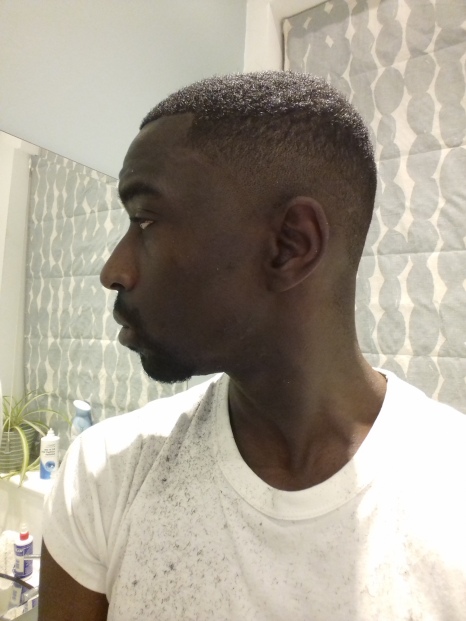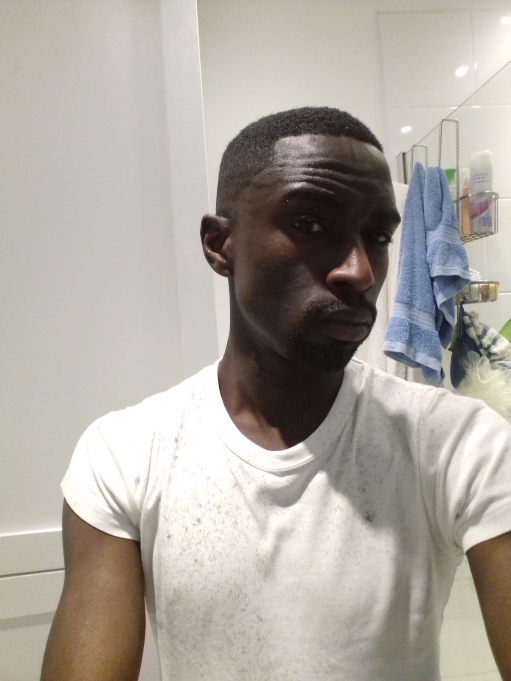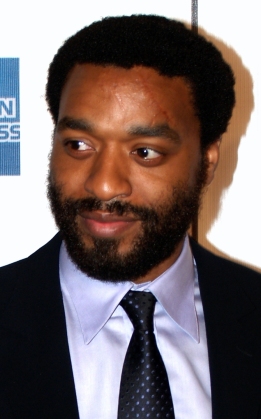By Jeffrey Boakye
Every ten days or so, give or take, I cut my own hair. As in on my head. In the realm of modern black masculinity, this is the equivalent of growing your own vegetables and using the skins and cores to manufacture your own biodiesel. Not to brag, but it really is a wondrous thing that I do; to periodically strip off to the waist and bravely step into the bathroom, grab a mirror, pout back at my reflection and set to work shaving a passable  haircut upon my own head, using tools that I bought from a hair and beauty and shop down the market.
haircut upon my own head, using tools that I bought from a hair and beauty and shop down the market.
At this point, I should probably insert a ‘don’t try this at home’ warning, in case you start thinking that a self-haircut is a realistically achievable thing. It’s not. It’s taken years of practice and a level of trial and error matched only by evolutionary genetics. I’ve been shaving my head since I was thirteen or so, when I realised that my haircut money could go quite some way towards satisfying my comic buying habit. Shortly after this moment of realisation, I convinced/ coerced/ cajoled/ conned my parent(s) into giving me £20 for the purchase of a set of home clippers, I think from somewhere in Brixton market. For the next five years I would steadily shave my head to an even level 0.5, which, if you didn’t know, is about a third of a millimetre away from a skinhead.
It wasn’t until I got to university that I drummed up the confidence (or folly) to attempt something other than a straight shave on my own head. It’s worth stressing that during this time I had visited various barbers at sporadic intervals, but my primary barber had always been Jeffrey Boakye, whose piece de resistance was the 10-minute buzz cut. But, as tends to happen with humans thriving for satisfaction, enough is never really enough. I suddenly wanted more. I wanted a proper trim. Something that looked like a real barber did it. I wanted a fade.
The problem is that a fade is an art form. It’s precision engineering in haircut form, not to be approached lightly. Which is exactly what I did, resulting in some seriously raised  eyebrows from my housemates when I emerged from my room with a supposedly ‘finished’ haircut. And this was before the days I used two mirrors to properly check the back of my head. It must have been horrific. Thankfully, it was also before the days of social media and smartphones, so the monstrosity remains undocumented.
eyebrows from my housemates when I emerged from my room with a supposedly ‘finished’ haircut. And this was before the days I used two mirrors to properly check the back of my head. It must have been horrific. Thankfully, it was also before the days of social media and smartphones, so the monstrosity remains undocumented.
Anyway, the years rolled on and, thankfully, so did my home-hair cutting skills. I experimented, I persevered, and I had a few slip-ups along the way, but ultimately, I got better.
But everything at a price, right? All those years spent cutting my own hair meant that I’d inadvertently severed my most direct connection to the Black Guy Universe, ie: the barbershop. If you ever want to see the black man in his natural habitat, I recommend visiting a) the continent of Africa or b) your local black barbers. As a child, I remember spending early Saturday mornings at IMAGE barbers on Brixton road, burying my face in a book while black men talked at volume about the kind of thing that black men talk about in a barbershop. And just at the point that I should have blossomed into this community of black males, I removed myself from the whole situation. By the time I got to university at Leicester, I couldn’t even divining rod my way to the nearest barbershop, at which I’m certain I would have found a whole parade of similarly pigmented peers. It sounds dramatic, but in opting to cut my own hair I might have accidentally and irrevocably stunted my journey into the world of black masculinity.
Now, I’ve reached the peak of my self-scissoring powers. I can achieve a smooth gradient from level 2 on top to bald around the ears, cutting with the grain on top to coax waves  out of my tough Ghanaian curls and against the grain on the sides to even out the transition. And, just like the freak who makes his own biodiesel, I’m something of an outcast.
out of my tough Ghanaian curls and against the grain on the sides to even out the transition. And, just like the freak who makes his own biodiesel, I’m something of an outcast.
On the few occasions that I have ventured into a black barbers (maybe eight or nine times since 2007, true story), I’ve felt woefully misplaced and vaguely displaced. I don’t quite know the waiting system and haven’t figured out how to call in advance. I don’t complain when the trim takes about an hour longer than it should because the guy cutting keeps popping out for a cigarette, and my conversation always seems to veer towards an assumed denominator of the lowest, most common variety. Like sport. Or something else that I can bluff my way through but don’t really have a vested interest in. I don’t know how much to tip, or whether or not to shake hands or touch fists. And I don’t dream of asking for specifics once I’m strapped in and sheeted up.
So why did I ever even bother? Why, in the past decade of life living in north and east London, after two decades growing up in south, did I leave the comfort of my own bathroom to get a haircut that I could approximate at home? The answer is simple: Hairline.
Of the entire black haircutting process, the hairline is the most significant part. It doesn’t matter how great the fade is; if the hairline is wonky, your haircut is a wreck. I don’t know who made up the rules but you’ve got to have the straightest razor sharp line curving across the top of your forehead, met with equally sharp lines at right angles coming down the temples. As though your face is being framed by the top of a mathematically perfect square. I can’t talk for all black men everywhere, but for me, a sharp hairline is a symbol of status and self-worth. It’s the crossed t and dotted i, the face enhancer that invites people to think you’ve got your shit together. I’ve lost count of the  number of occasions that colleagues have slowed down in corridors to half squint and offer a compliment on my appearance, wrongly attributing my inner glow to a particular tie, new shoes, or certain colour combination of outfit, when in fact it’s all down to a fresh trim. A lot of non-black people don’t get it – they think that our hair stays the same just because it’s short, but when it’s cut, and when it’s cut right, the difference is palpable. #hairlinesmatter.
number of occasions that colleagues have slowed down in corridors to half squint and offer a compliment on my appearance, wrongly attributing my inner glow to a particular tie, new shoes, or certain colour combination of outfit, when in fact it’s all down to a fresh trim. A lot of non-black people don’t get it – they think that our hair stays the same just because it’s short, but when it’s cut, and when it’s cut right, the difference is palpable. #hairlinesmatter.
Social media agrees. Ever since I started following barbers on Instagram and commenting on their work (with well-chosen emojis), I have been inundated with followbacks, replies and baitworthy likes on the few photos I have on my account from barbers looking for new fans. Two big realisations here: First, just how big the barbering community actually is, and second, how close I feel to this community. I know I said that cutting my own hair in some ways cut me off (pun intended) from a wider community of black men, but paradoxically, the inverse is equally true. When I cut my own hair I feel like I validate my blackness. Every time I put those vibrating, oiled, serrated blades to my own scalp, I’m confirming something of my identity as a black man.
A former colleague of mine has a theory about hair. She maintains (and I think there’s some truth in this) that the more working class one is, the more sculpted and managed one’s hair becomes. It’s a somewhat Marxist slant on hair politics, that those with fewer socio-economic privileges do the most with their hair, while those enjoying hereditary wealth go for the maddest, most unruly, poshest hair possible. Those in between, namely the bohemian culturati and middle-class social climbers, fall somewhere in the grey area, aspiring for understatement but unable to shake proletariat codes that demand a certain level of follicular deliberation. There are, of course, anomalies to this theory. Elizabeth II, the Queen of England, is one of the most famously privileged and wealthy individuals on the planet, has a perfectly coiffured hairdo as opposed to the mad bird’s nest you might  expect from a member of the landed aristocracy. Ditto for Kim Jong-un, champion of nuclear armament, human rights violations and the skin fade short back and sides. Then you get all those individuals just too devoid of anything approaching style to even enter the debate, like golfers, unhappy dads and career politicians. But generally speaking, the idea that hair and class is related holds up pretty well to interrogation. Until you throw black into the mix.
expect from a member of the landed aristocracy. Ditto for Kim Jong-un, champion of nuclear armament, human rights violations and the skin fade short back and sides. Then you get all those individuals just too devoid of anything approaching style to even enter the debate, like golfers, unhappy dads and career politicians. But generally speaking, the idea that hair and class is related holds up pretty well to interrogation. Until you throw black into the mix.
In the intersection of race politics and class politics, I find my hair and myself to be a fascinating case study. Grayson Perry once wrote that ‘taste is woven into our class system’, but I don’t know where how or if black people fit into this system in the first place. Right now, writing from the comfort of a three-bed terrace with extension and loft, peering into an iPad screen through Paul Smith frames and wondering whether or not to cut my hair tonight or tomorrow night, I think I’m middle class, but that might be a delusion. Can a black man even be middle class, if being black is an automatic state of disempowerment within the class system? By dint of skin colour, am I not automatically lower down the rungs of that particular ladder?
According to Sue’s theory, my hairline obsession aligns me to working class ideals, which makes sense in the context of my life as a second generation Black British immigrant. Beyond this, my compulsion to achieve perfect hair might be a bid for self-empowerment, not simply in terms of self-sufficiency, but as an attempt to craft a confident persona. We have to keep this in context. I grew up in that decade called the Nineties, a historical period characterised by grungy, hang-loose, slacker style. You might remember the baggy jeans and ill-fitting everything, and if you’re a white guy, you might have had too-long hair that you had to keep pushing behind your ears between pushes of a skateboard. But for black kids like me, swimming in an RnB tsunami of export American cool, hair had to be sharp, short and on point. The accusation of having ‘picky’ hair was enough to draw tears, or fists, or both, while a fresh trim could keep the bullies off your back for at least 10 days (the general amount of time before cut hair becomes in need of cutting again). Nowadays, it’s different. As I scan my eyes over the heads of all  the black and ‘black’ boys in year 11 at my school, I can see out of control afros, dangling twists, knotty high-tops, skiffles and cornrows, all mingling in a wonderfully eclectic coiffure parade. Meanwhile, my generation won’t go a month without a shape-up, unless you happen to be Chiwetel Ejiofor, CBE. How far we’ve come.
the black and ‘black’ boys in year 11 at my school, I can see out of control afros, dangling twists, knotty high-tops, skiffles and cornrows, all mingling in a wonderfully eclectic coiffure parade. Meanwhile, my generation won’t go a month without a shape-up, unless you happen to be Chiwetel Ejiofor, CBE. How far we’ve come.
Add it all up and I can confidently say that through we might never see a black Prime Minister (for reasons of systemic racism and ingrained prejudice that act like gravity on liberal idealism), we definitely won’t see one with a sharp hairline. That would make him too street, too working class, too stylish, too young and too preoccupied every ten days of his life to successfully run the country. No, our first black PM will have the unshaped hairline of adult maturation, free of the insecurities that I hope haven’t derailed this chapter too much.
Jeffrey Boakye is a writer, teacher and music enthusiast from Brixton, now living and working in East London. He has a particular interest in issues surrounding education, race and popular culture. Jeffrey has taught English in London secondary schools and sixth form colleges since 2007. Follow him on Twitter @unseenflirt
His first book, Hold Tight: Black Masculinity, Millenials, and the Meaning of Grime is out on general release on July 6th.
If you enjoyed reading this article and you got some benefit or insight from reading it buy a gift card or donate to keep Media Diversified’s website online. Or visit our bookstore on Shopify – you can donate there too!
All work published on Media Diversified is the intellectual property of its writers. Please do not reproduce, republish or repost any content from this site without express written permission from Media Diversified. For further information, please see our reposting guidelines.

I’m really confused by your assumption that the UK’s first black PM will be a man. Hmmm.
I’m banking on a woman with a full fro.
LikeLiked by 1 person
How come Barack Obama always had a regular fade? His hair game was on point! Didn’t he fly in his favourite barber to cut his hair or visit him when he was near Chicago? Barry O-B was never one for an Afro or high top! I think you’re slightly wrong with UK politicians. Most of them have #2 fades like David Lammy or shave bald if it’s receding like Chuka Umunna.
LikeLike
I teared up! Very moving.
LikeLike
A great read. Looking forward to the book in July
LikeLike
Brilliant and enjoyed.
LikeLike